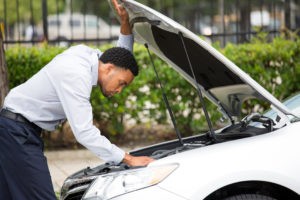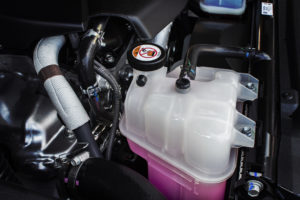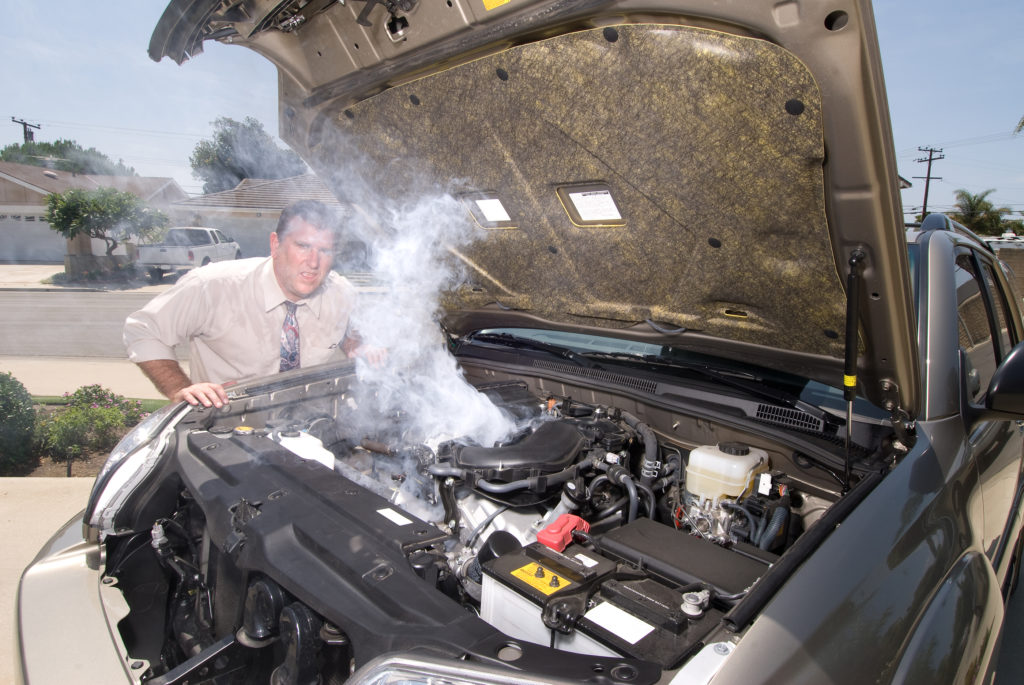If you notice that my car is running hot, you are right to be concerned. There are many potential reasons that your car overheats or runs hot. It may indicate a major problem that requires extensive repairs, or it may be a simple fix.
No matter what, anytime that you have to ask yourself why is my car overheating, you should get to the bottom of the problem as soon as possible. Timely repairs will save you money and hopefully get your car running smoothly again. Delaying can cause worse problems.
Learn everything about what to do with a car running hot, from why my cars overheating with full coolant to coolant change cost to what to do about it.
If Your Car Overheats, It Will Happen Again
One very important thing to remember is that if your car overheats at some point, it will likely do so again unless you take action. You need to figure out why is my car running hot and work with your mechanic to determine why my car keeps overheating. Whether it is a hot coolant temperature, clogged heater core, low antifreeze, or another issue, you need to get to the bottom of the problem and resolve it.
Otherwise, you will find yourself dealing with problems like the temperature gauge goes up and down while driving or the heater not working in car.
What to Do With a Car Overheating? What to Do When Your Car Overheats
If you have a car or truck overheating, the first thing to do is to stop the vehicle and turn off the engine. You need to let the engine cool off. This may be as simple as pulling over to the side of the road and waiting a few minutes to an hour. Unfortunately, sometimes your car keeps overheating when you turn it back on. In this case, what to do if your car overheats again?
If my car keeps overheating, I know that I need to deal with a more serious problem, not a one-time issue. This is not the type of issue that you can put off, as letting your engine overheat for longer will increase the damage caused. Worse damage translates into higher repair costs and mechanics needing longer to fix your car.
What Should You Do If Your Temperature Gauge Moves Up to Just Below the Red Zone?
If the temperature gauge moves up to just below the red zone, or into the red zone, stop the car right away. Find a safe place to pull over and do so. You may even need to call your mechanic and have them tow your car.
In some cases, you might be able to just give the engine some time to cool down and then safely drive it to the mechanic. If you go this route, look out for the car overheating while driving, since engine overheating damage can be severe.
For Less Serious Cases, Try Going to the Highway
Sometimes, your engine may actually cool off more quickly if you are able to drive faster. If the engine is overheating and you are on a slow-moving road, consider heading to the highway. When you drive at highway speeds, more air gets pushed through the radiator, helping the engine cool faster.
Remember, however, that this method has risks and requires careful attention. If the temperature gauge reaches the red zone or gets close, you need to pull over and stop. You do not want an overheated car stranding you on the highway or causing severe damage.
Why Does My Car Keep Overheating? What Causes a Car to Run Hot?

If you find yourself asking why is my car engine running hot, there are many potential explanations, ranging from simple fixes to complicated problems that can be expensive to fix.
Some of the most common reasons for your car running hot or the engine overheating include the following:
Blocked Radiator
Sometimes, the radiator will be blocked. When this happens, the antifreeze cannot flow through it. That results in an inability for the radiator to disperse the heat into the air as it should, leading to an overheating engine.
Low Engine Coolant
One of the most common causes of engine overheating and perhaps the easiest fix for a car running hot is low engine coolant. This can be a simple fix if it just got low, but a leak can require more extensive repairs. Leaks can be internal or external. When the level is too low, proper cooling cannot occur.
You may also notice a hot coolant temp or the engine coolant hot.
Head Gasket Blown
Some people may also notice that their car is overheating due to a blown head gasket. In this case, coolant will be able to leak out and air can get sucked in. To further complicate matters, a blown head gasket can cause the needle of your engine temperature gauge car to reach full hot. Car overheating head gasket issues require immediate attention.
Plugged Heater Core
The heater core or heater exchange in the car is responsible for ensuring that you stay warm on the colder days. Sometimes, this core will get plugged and lead to the engine overheating. This overheating comes from restrictions on the coolant flow. Familiarize yourself with clogged heater core symptoms and bad heater core symptoms so you can recognize them when your car has no heat. This way, you can diagnose and prevent heater core problems. Can you drive with a bad heater core? You should not because what happens when your heater core goes out can cause complications.
Stuck Thermostat
Your engine’s thermostat is responsible for regulating its temperature. In many cases, lower-end thermostats may get stuck closed. This makes it harder to regulate the temperature and can result in restrictions on the flow of coolants.
Water Pump Failure
The water pump is crucial as it helps circulate the engine coolant. If it fails, it cannot circulate this coolant, which is essential for removing extra heat that is inside the engine.
What Will It Cost to Repair an Overheating Car?

There is no clear-cut answer to how much it will cost to repair your overheating engine. The cost depends on the problem and the difficulty in repairing it. It will also depend on how much damage the overheated engine already caused.
If you saw your engine warning light turn on and immediately turned off your engine, you hopefully have minimal damage and will have inexpensive repairs. However, if you ignored the check engine light and eventually saw steam pour out of your engine or a puddle of coolant on the ground, you may be out several hundred or thousand dollars.
More Affordable Repairs
Some of the more affordable repairs to overcome your overheating car will typically cost just a few hundred dollars, perhaps less. These can include replacing the thermostat or heater hose, flushing the antifreeze, and repairing the cooling fan wire.
More Expensive Repairs
For most cars, some of the more expensive repairs to overcome the car running hot will cost between $500 and $1,500. These include replacing the water pump, radiator, or head gasket and changing the heater core cost. If you have a specialty engine or a diesel, these repairs may be even more expensive. A coolant leak fix cost can also be low, depending on the cause.
Extreme Overheating
In the case of extreme overheating, your mechanic will likely want to conduct some more detailed testing. This will include pressure testing and inspecting the cylinder heads for any signs of warping. They will also want to look for potential cracks on the engine blocks, which can happen with extreme temperatures or temperature changes.
If your car keeps overheating and you put off repairs, the engine may even seize up. This could require a complete rebuild, which will be at least several thousand dollars.
When the Engine Cannot Be Repaired
If you are unlucky, then your engine may not even be salvageable following the car overheating. In this case, you will have to completely replace it. This will easily cost several thousand dollars, and that is for the engine alone. You will also have to pay for labor. Keep in mind that more powerful or specialty engines can cost even more to replace.
You could save some money on a replacement by going with a used engine, but you will have no guarantee of the condition. A used engine may have its own problems within months or a few years.
The Repairs May Cost More Than the Auto’s Value
Depending on the condition of your car before my car overheated, the repairs may not even be worth it. This leads you to wonder what to do when the repairs cost more than the car.
A simple solution is to sell it as is, to a company like us that specializes in buying autos regardless of their condition.
There may also be some trial and error, such as if you have replaced radiator and thermostat car still overheating. Your mechanic will help with car overheating troubleshooting, including assessing overheating car damage.
Common Questions About a Car Running Hot
To give you a better idea of why is my car overheating, look at some of the most common questions regarding your car running hot.
What Does It Mean When Your Car Overheats? What Does It Mean When Your Car Runs Hot?
There is no single answer to what makes a car run hot. You may notice my car is overheating for a range of reasons, most of which are outlined above. Your mechanic can diagnose the issue.
The Car Smells Hot But Not Overheating – Why?
Sometimes, your car may smell hot but not be overheating according to your temperature gauge. This can be incredibly confusing, especially for those who are not mechanics. In this case, you should still have your car inspected.
The problem may be something simple like a plastic bag on the exhaust or some spilled oil. On the other hand, it can be a more problematic issue such as a seized brake caliper or burnt wiring. Just remember that if you have a car running hot but not overheating, you need to get it checked out.
Engine Overheating But Coolant Full – Why?
When looking for what makes a car run hot, most people will check the coolant first, which is a smart decision. Sometimes, however, your coolant may be full but the car runs hot. In this case, there is an issue that is not related to the coolant. If, for example, the problem is with the radiator itself, you may experience a situation where the car has coolant but still overheating.
You are unlikely to find the answer to car overheating coolant full, car is overheating with full coolant, or coolant reservoir full but car overheating without consulting a mechanic.
Car Smells Like Antifreeze But Not Heating or Leaking Antifreeze But Not Overheating – Why?

You may have a coolant reservoir overflowing and overheating or notice the car losing coolant but not overheating. This does not eliminate an issue with the coolant. The answer to what does low coolant mean can vary and there may be problems you cannot see.
Car Overheating No Heat – Why?
Sometimes, you may have the car temperature gauge hot but engine cool. The temperature gauge high but car not overheating may occur from the same engine overheating causes already mentioned.
How Long for Engine to Cool?
You know what to do when the car overheats and smokes and that is to pull over and let it cool down, but how long does this take?
Car Overheating While Idling and in Other Specific Situations – Why?
There are many specific situations that can arise regarding your radiator overheating or car engine overheating, including:
- Car heats up when idling but cools when driving.
- Car overheats when idling or car overheating when idle.
- Car smoking under hood but not overheating.
- Car overheated won’t start.
- Car overheating with AC on.
- AC off due to high engine temp.
- No heat in car.
- Heating not working in car.
- Losing coolant no leak no overheating.
It is impossible to know if you have car thermostat problems, low coolant symptoms, symptoms of a stuck thermostat, engine coolant low, symptoms of a clogged radiator, clogged radiator symptoms, symptoms of a bad radiator, signs of a bad heater core, or something else without consulting a mechanic.
This is true whether you have a PT Cruiser overheating, Jeep overheating, BMW overheating, Mini Cooper overheating, BMW leaking coolant but not overheating, or another model. Most vehicles will work similarly.
Is the Cost of Repair Too High? Don’t Want to Deal With the Hassle of Repairs? Consider Selling Your Car As Is
Depending on your situation, it may not make sense to fix your car if it is overheating. Or you may just not have the time and energy to take care of the issue.
Maybe your car is only worth a few thousand dollars, but the repairs would cost more than that or the full value of the car. Or maybe you just do not have the time to wait for the mechanic to determine the problem and fix it, leaving you without a car in the meantime.
Or, maybe you had been thinking about getting a new car anyway before this damage to the engine came up. You may then use the necessary repairs as an impetus to replace your car sooner rather than later.
No matter the reason you decide not to go ahead with the auto repairs for your car running hot, you do have other options. Specifically, you can sell your car as it is, without needing to make any repairs yourself.
Finding a Buyer
The problem for most people looking to sell a car with an overheating engine or other issues is finding a buyer. You need someone who does not care that the car is not in good shape and cannot run. Most used car dealerships will not buy your car or will give you a very low price if they do accept it.
You could try to sell the car for parts, but this will require a bit of effort on your part. You would need to separate the functional components from the non-functional ones and find a buyer for each. It would be easier to just bring the car to a junkyard, but this will usually get you a very low price.
We Buy Your Car Regardless of Condition

No matter the condition that your car is in, we will gladly buy your car and give you cash in exchange for it. We do not care if your car overheats when idle, there is no heat working in car, there is a bad thermostat in car, or the car runs hot. We will buy your car even if it does not run.
We also make it quick and easy to sell us your car. Just fill out our simple online form or give us a call to get a quote. If you accept our offer, we will come to pick up your car and give you cash in exchange. There are no hidden fees so you can maximize your cash.
Then, you can put that cash toward a new or used car that runs properly. Instead of worrying about the water pump leak repair cost or your truck overheating, we can give you cash and one less worry.



